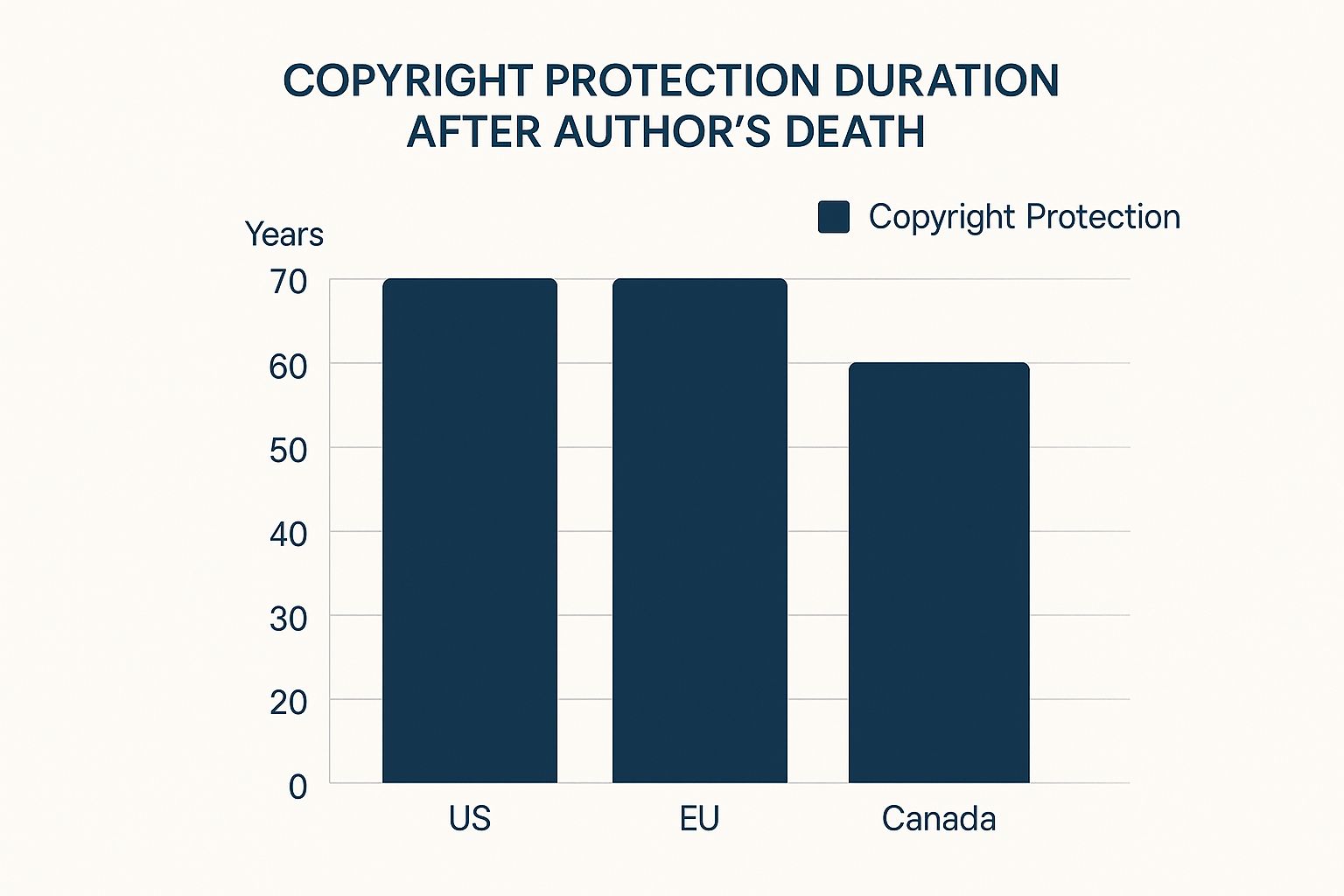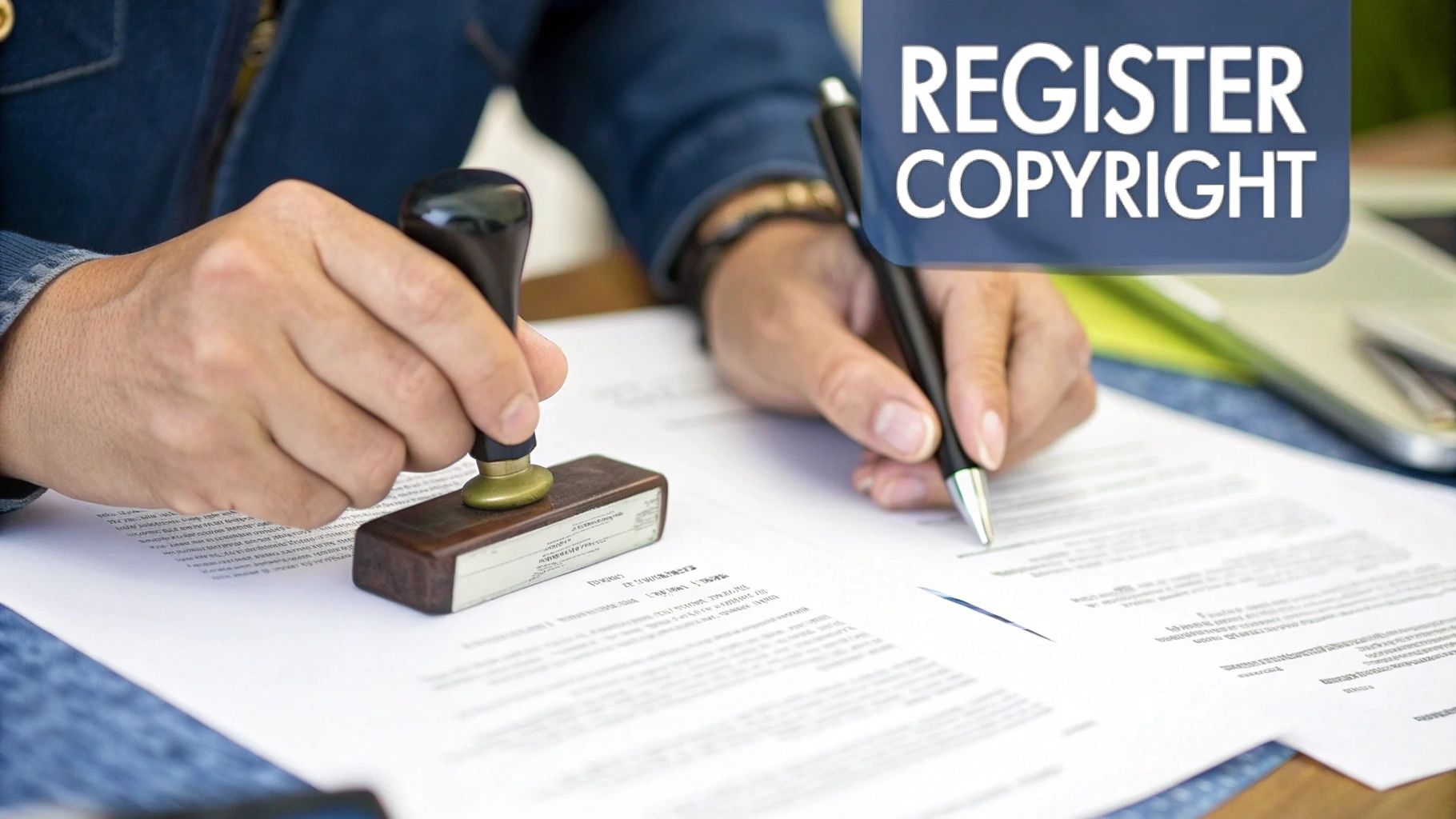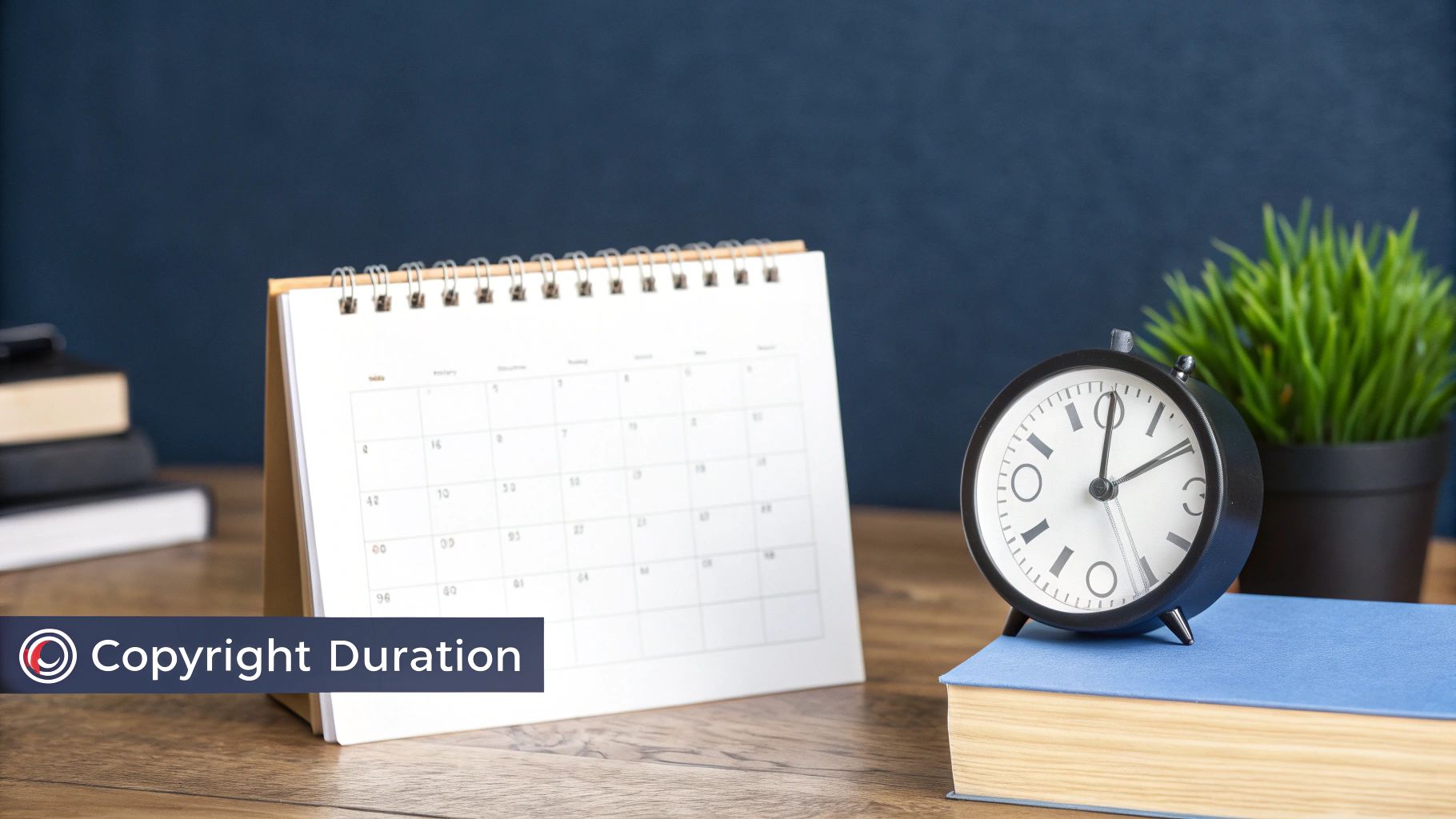What Most Authors Get Wrong About Copyright Protection
I've talked to a lot of writers over the years, and you know what consistently surprises me? How many misunderstand copyright. Most assume their work is protected the second they finish writing, and technically, they’re right. This is called automatic copyright, and it applies the moment your masterpiece exists in a tangible form – a Word doc, a Google Doc, even scribbled on napkins (though I wouldn't recommend that last one). But here's the catch: having automatic copyright and being able to prove it are two different things.
Think of it like this: you might own a vintage guitar, but without the proper paperwork, proving it's yours if it gets stolen is a nightmare. It's the same with your writing. Let's say someone swipes your manuscript and publishes it as their own. Without a formal copyright registration, proving you're the true author is like trying to find a needle in a haystack. You might know it’s your work, but how do you convince a court?
In the US, copyright is automatic. The moment you write or save your work, it's legally protected. Yet, the U.S. Copyright Office still registers hundreds of thousands of works every year. In 2023, they registered 577,400 copyrights – and that's not just books, but music, art, and more. You can see some interesting stats about these registrations here. This tells us something important: even with automatic protection, authors understand the value of formal registration. So, why the extra step?
Formal registration gives you legal muscle that automatic copyright simply doesn't. It's a public record of your ownership, time-stamped and official. This is crucial for claiming statutory damages and attorney’s fees if someone infringes on your work. I spoke to one author who successfully defended her work against infringement because she had registered it. She called it "the best insurance policy" she’d ever invested in. And that's the key takeaway: registration isn't just about having copyright, it's about having the strongest possible legal footing if things go sideways. While automatic copyright offers a basic level of protection, registration is like locking down your work with a Fort Knox-level security system.
Mastering the Registration Process Like a Publishing Pro
Registering your copyright can feel like a trek through legal jargon, but trust me, it’s simpler than it seems. After helping tons of authors navigate this, I've learned it’s the little things that cause headaches, not the law itself. So, let's break it down and turn you into a copyright whiz.
Gathering Your Materials
Before you even glance at Form TX or the electronic CO, get your ducks in a row. It’s like prepping for a big trip – you wouldn’t leave home without your passport! Your copyright registration "packing list" is short and sweet:
- Copy of your manuscript: This is your main event, the core of the whole process.
- Application fee: Think of this as a small investment for major protection.
- Your contact information: So the Copyright Office can keep you in the loop.
Having these ready makes everything smoother. It’s like having your boarding pass and ID ready at airport security – it saves time and stress.
Choosing Your Filing Method
You've got two options: online or snail mail (paper filing). Online is quicker, cheaper, and gives you instant confirmation. It's like booking a flight online – efficient and easy. Paper filing, on the other hand, is like using a travel agent: slower and more expensive.

This screenshot from the U.S. Copyright Office website shows the different registration options. It lays out the formats and filing methods, making it easy to pick what works for you. For most authors, especially if you're publishing ebooks, online is the clear winner.
Navigating the Forms
Whether you’re using Form TX (for written works) or the electronic CO, remember: clarity is king. Imagine filling out a customs form – vague answers mean delays. Be precise with titles, dates, and authorship details. Even a small typo can hold up your registration for months – I've seen it happen firsthand!
Handling Tricky Situations
Co-authors, pen names, multiple versions… These might sound complicated, but they’re totally manageable. Think of co-authorship like a joint bank account – both names need to be on there. Pen names are like nicknames – provide your legal name too, to avoid confusion. Multiple versions? Treat them like different editions of a travel guide – each one gets its own registration.
Want to learn more about the publishing process? Check out our guide on how to become a published author. Copyright is just one piece of the puzzle, but understanding the whole process can empower you to take charge of your publishing journey. Remember, while these steps are straightforward, proper copyright registration is vital for protecting your hard work. It's like insuring your most valuable possession – you wouldn’t leave it unprotected, would you? Your book deserves the same level of care.
Smart Money Decisions for Copyright Registration
Registering your copyright can feel like just another box to check, but it's actually a strategic move. Like any good investment, timing matters. Let's talk about how to make the most of your copyright registration budget and avoid spending unnecessarily.
Standard Vs. Expedited Processing
For most authors, standard processing does the trick. Think of it like regular mail—it arrives eventually. But what if you're up against a deadline, maybe a book launch or a legal issue? That's when expedited processing comes to the rescue. It's like priority mail—you get what you need, fast. Speaking of book launches, you might find this interesting: How much does it cost to publish a book?
Timing Your Registration
So, when is the best time to register? Generally, registering just before publication is the sweet spot. This locks in your protection before your work goes live. Registration typically costs between $45 and $85 per work, depending on how you file. You can find more info on copyright registration costs.
Handling Multiple Formats and Editions
Now, what about different formats of your book, like ebook and print? No need to register each one separately. A single registration covers all formats of the same edition. However, if you publish a revised edition with major changes—like a second edition with new chapters—then you'll need a new registration for that version. There are some really helpful tools available to manage the copyright process. Even something like custom cabinet design software can offer inspiration for organizing and tracking your creative projects.
To help you decide which registration option suits your needs best, I've put together a handy table:
Copyright Registration Investment Guide
Real-world comparison of registration options with costs, timelines, and practical recommendations
| Registration Option | Investment Required | Timeline | Best Scenarios |
|---|---|---|---|
| Standard | $45-$85 | Several months | No immediate urgency, routine registration |
| Expedited | Additional fees | Within a few weeks | Time-sensitive situations, legal matters, impending publication |
This table quickly outlines the main differences between standard and expedited processing, making it easier to choose the right option for your circumstances. Expedited processing, while quicker, comes at a higher cost, so it's best reserved for time-sensitive situations.

This infographic compares copyright protection duration after an author's death in different parts of the world. Notice how the US and EU offer 70 years of protection, while Canada provides 50 years. It highlights why understanding international copyright law is so important, especially for authors with a global audience. Choosing the right timing and registration options ensures you get the most out of your investment. Copyright protection, after all, is an investment in your creative work and its future.
Understanding How Long Your Protection Actually Lasts

Copyrighting your book isn't something you do once and then forget about. The protection it offers isn't forever, and the rules can be surprisingly tricky. Let me break down how long your copyright actually lasts.
Copyright Duration for Individual Authors
For works created after 1978 in the US, copyright typically hangs around for the author's lifetime plus 70 years. That means your great-grandchildren could potentially still be benefiting from your creative endeavors. This is a change from how things worked with older works, which had different terms and sometimes even needed renewals.
It's worth noting that this 70-year post-mortem protection gives your family a significant period to manage and profit from your work. This can provide a lasting legacy, both creatively and financially.
Copyright Duration for Collaborative Works
Things get a little more interesting with collaborations. When several authors contribute to a single work, the copyright sticks around for the lifetime of the last surviving author plus another 70 years. This is a crucial detail when teaming up on projects. Make sure your agreements clearly spell out each author's rights and responsibilities. I've seen situations where this wasn't properly addressed upfront, leading to headaches down the line.
Clear communication and legal advice at the beginning of a collaborative project can save a lot of trouble later. Trust me on this one.
Approaching Public Domain Status
As your work inches closer to the end of its copyright term, it's good to know what happens next. Once the copyright expires, the work becomes part of the public domain. Anyone can then use, adapt, and publish it without needing your permission. This can be a fantastic way for your work to find a larger audience, but it also means you no longer have exclusive control.
Think of classic literature like Shakespeare – it's in the public domain and freely accessible to everyone. This allows for new interpretations, adaptations, and a continued appreciation for the work.
International Copyright Considerations
Copyright protection is a whole different ballgame internationally. Across the globe, laws and practices vary wildly. Many major economies, like the United Kingdom and the European Union, follow similar principles, though. In the UK, copyright on a book typically lasts for the author's lifetime plus 70 years, a standard adopted by most EU countries before Brexit. You can find more detailed information here.
If you’re aiming for an international readership, understanding the quirks of different copyright systems is a must. It can get complicated, so getting advice from an expert is never a bad idea. I've learned that navigating international copyright can be a real challenge, so professional guidance is invaluable.
Speaking of helpful resources, you might be interested in this guide on how long it takes to publish a book. It helps map out the entire publishing journey. And if you're thinking about marketing, understanding your SMS marketing ROI can be a real game-changer.
Managing your copyright internationally is all about reaching wider audiences and solidifying your platform. Think of it like translating your book – it broadens your reach and potential impact. Protecting your work internationally doesn’t have to be overwhelming. With a bit of planning and the right resources, you can ensure your book gets the full protection it deserves, no matter where it's published.
Building Real Protection Beyond the Paperwork
Registering your copyright is important, sure. It's the bedrock, the foundation. But like building a house, you wouldn't stop at the foundation, right? Savvy authors know they need more than just the paperwork. They build layers of protection around their work. Let’s talk about some of those practical, battle-tested strategies, from meticulous record-keeping to dealing with those pesky copyright infringers.
Maintaining Ironclad Documentation
Think of your documentation as your copyright arsenal. It’s not enough to have files; you need the right files, organized so they’re actually useful if a dispute crops up. This means keeping detailed records of your manuscript’s journey—all those drafts, revisions, even your scribbled notes and outlines. It’s like keeping a detailed log of your home’s construction—proof of every nail and board. Similarly, this documented proof of your creative process significantly strengthens your copyright claim.
Monitoring for Infringement (Without Losing Your Mind)
Look, you don't have to become a copyright vigilante. But staying aware is key. Google Alerts are your friend here. Set them up for your book title and any unique phrases. Every now and then, do a quick browse of online bookstores and platforms. Look for anything suspiciously similar. It's about being proactive, not paranoid. A friend of mine found a pirated version of her ebook on some shady website just by Googling her title. Thankfully, she had registered her copyright and was able to get it taken down quickly. That registration made all the difference.
Taking Action Against Unauthorized Use
Discovering your work being used without your permission? It’s a punch in the gut. But knowing how to react is vital. First, document everything. Screenshots, saved web pages—gather any evidence you can. Then, the cease and desist letter. This formal notification is often enough to resolve the issue. If not, you're in a much stronger position to take further legal action, especially with that registered copyright backing you up.
Working with Publishers and Agents
Your relationships with publishers and agents should always respect your copyright. Read contracts with a fine-tooth comb. Really understand the rights you’re granting, and don’t hesitate to ask questions. A fellow writer I know almost signed away some important rights without even realizing it! A quick chat with an entertainment lawyer saved them from a potentially disastrous mistake.
To give you a better grasp of how to manage your copyright protection, I've put together a handy toolkit. It summarizes the key strategies we've discussed.
Author's Copyright Protection Toolkit
Essential protection strategies with priority levels and practical implementation steps
| Protection Strategy | Importance Level | Required Documentation | Implementation Timeline |
|---|---|---|---|
| Copyright Registration | High | Manuscript copy, application fee | Before publication |
| Detailed Record Keeping | High | Drafts, revisions, notes | Throughout writing process |
| Infringement Monitoring | Medium | Screenshots, web pages | After publication |
| Legal Consultation | As Needed | Contract copies, correspondence | Before signing agreements |
This toolkit outlines the essential elements of protecting your creative work. Remember, a solid copyright strategy is a continuous effort, not a one-time thing. By integrating these practices into your writing and publishing routine, you're not just protecting your work—you’re safeguarding your future as an author.
Learning From Others' Expensive Copyright Mistakes
Copyright. Just the word can make even seasoned authors shiver. It can feel like navigating a legal minefield, and trust me, I've heard enough stories to fill a book (a copyrighted one, of course!). From authors and agents to even intellectual property lawyers, the tales of copyright mishaps are surprisingly common. And these aren't stories of intentional wrongdoing, but rather simple oversights that can end up costing creators dearly. Let's break down some of the most frequent (and expensive) mistakes so you can avoid them.
Registration Errors That Invalidate Claims
One of the biggest traps is messing up the copyright registration itself. Imagine meticulously crafting your masterpiece, only to submit your application with the wrong title or omitting key details. These seemingly small errors can actually invalidate your entire claim. Think of it like applying for a passport: a simple typo can delay your trip, or worse, prevent you from traveling altogether. I once spoke with an author who discovered, years after publication, a typo on her registration form. This seemingly insignificant error significantly weakened her copyright protection. Luckily, she caught it before any major issues arose, but it was a stressful experience that highlighted the critical importance of accuracy in the copyright registration process.
Documentation Errors That Weaken Protection
Even after you've successfully registered your copyright, maintaining accurate records is essential. I've heard horror stories of authors losing crucial documents or failing to keep proper track of revisions. If a copyright dispute arises, having detailed records of your work's evolution, from initial drafts to the final published version, is your best defense. I knew an author who faced a legal challenge simply because they couldn't locate their original manuscript. It was a long, drawn-out, and expensive battle that could have been easily avoided with proper documentation. Thorough documentation is like having an airtight alibi – it can be the deciding factor in protecting your work.
Timing Issues and Gaps in Coverage
Another common mistake is mistiming the copyright registration. Registering too late, or not at all, can create vulnerabilities in your protection. I spoke with a writer who waited until after their book was published to register their copyright. When someone infringed on their work, their legal options were severely limited. Had they registered beforehand, they would have been in a much stronger position. Registering your copyright before publication isn't just a good idea; it's a fundamental step in protecting your creative work.
Learning from others' mistakes is often the best education. These aren't just abstract legal concepts; they are real-world situations that can significantly impact your career. By understanding these common pitfalls and taking proactive steps to avoid them, you can safeguard your work now and for the future.
Your Personal Copyright Action Plan
So, we've talked a lot about copyright. Now, how do you actually use this information? Think of this as your personalized copyright roadmap, whether you're about to unleash your debut novel on the world or you're juggling a whole collection of short stories.
Prioritizing Copyright Based on Your Publishing Goals
Your copyright strategy really depends on what you're aiming for. Traditional publishing? Self-publishing? Something in between? If you're going the traditional route, your publisher will likely handle some of the copyright legwork, but you still need to understand your rights. Self-publishing? You're the captain, the CEO, the copyright champion. You're in charge of registration and enforcement.
For example, I have a friend who self-published a fantasy series. She registered the copyright for each book before it launched, understanding how important proactive protection is in the self-publishing world. Smart move.
DIY vs. Professional Legal Help
Let's be honest, lawyers can be expensive. Sometimes, though, they're a worthwhile investment. Simple registrations? You can probably handle those yourself. But if you're dealing with more complicated situations – like co-author agreements or international publishing deals – getting professional legal advice is crucial. Think of it like a plumbing problem. Small leak? You might be able to fix it yourself. Burst pipe? Definitely call a plumber. Same with copyright. Don't let small legal issues turn into major headaches down the road. Protect your work!
Building Copyright Management into Your Writing Routine
Copyright doesn't have to be a burden. Make it a natural part of your writing life. Create a simple checklist for each new project. Add copyright registration reminders to your publishing calendar. And for goodness sake, back up your manuscripts! It sounds like a lot, but it's really just smart practice. Think of it as an investment in your future success.
Ready to level up your publishing journey? BarkerBooks offers comprehensive support for authors, including copyright protection and global distribution. Learn more about how BarkerBooks can help you publish your book.

